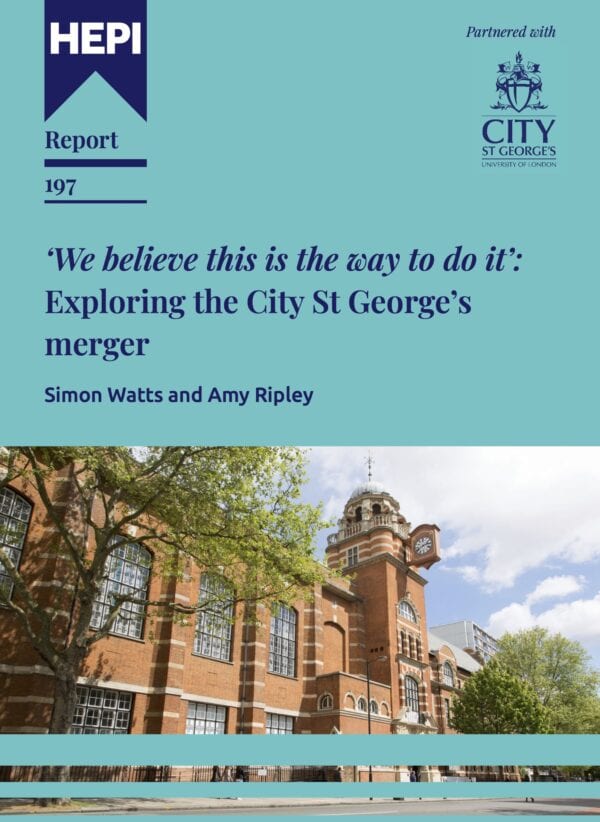Renters’ Rights Bill – The Devil’s in the Detail
By Martin Blakey, the former Chief Executive of the student housing charity Unipol and a member of the British Property Federation’s Student Accommodation Committee.
HEPI has maintained, as one would expect, a serious interest in student housing and the impact this Bill will have on students. The last update was given on 3 February 2025, and since then, there have been significant developments. On that basis, this update covers three areas:
- Work has finally commenced on how purpose-built student accommodation (PBSA) will transition from the current assured student tenancy regime into common law tenancies, as those tenancies are largely outside the provisions of the Act;
- The Renters’ Rights Bill (RRB) is now at the Lords Committee Stage, and on 22 April 2025, around half the day was taken up discussing student-related housing, giving a clear indication of the Government’s thinking on the outcome of the Bill and student housing; and
- The Government-approved Unipol/ANUK National Code has undergone significant revision and is now out for public consultation before its final text is agreed.
Purpose-Built Student Accommodation (PBSA)
Long overdue work is now taking place by the Ministry of Housing, Communities and Local Government (MHCLG) to establish the mechanism whereby PBSA providers will become ‘specified’ under the Housing Act (1988). This will put them outside the remit of much of the Renters’ Rights legislation.
As part of the earlier discussions on this with the British Property Federation (and their Student Accommodation Committee), MHCLG had previously advised that existing tenancies would automatically become common law tenancies. However, on 1 April, Unipol was informed that there were problems with this and that Assured Shorthold Tenancies (ASTs) existing before the implementation of the Act will now transition to be assured tenancies that will fall under the remit of the Act.
This may seem a rather nerdy legal change with little impact, but it would be a mistake to conclude that.
The timescale of the Bill has self-evidently slipped from the initial aim of obtaining Royal Assent by Easter 2025, and the Government is racing to ensure that it passes through all its parliamentary stages by the summer recess on July 22, 2025. Some aspects of the Act will be subject to further detailed consultation, but the main tenure reforms will be implemented quickly. This rush to get the Bill through its parliamentary stages may explain the evident ‘make do and mend’ approach to the transition of PBSA tenancies. This rush certainly explains the Government’s unwillingness to accept any non-Government amendments in both the Commons and the Lords.
Because PBSA tenancies will now transition into assured tenancies, the timing of implementation is important because it will determine the extent to which the PBSA market will be disrupted by this change of position. It is reasonable to conclude that tenure changes are likely to occur around December 2025 or January 2026. Since most students living in PBSA will have already signed contracts for the 2025–26 academic year, around 402,000 students are expected to be affected, based on the Unipol/NUS Accommodation Cost Survey 2021. Only bed spaces provided directly by universities will fall outside of these transitional arrangements.
So, what are those arrangements?
Previous AST tenants, as they become assured tenants, will:
- Be able to pay rent monthly, and longer payment periods will be unenforceable. It is not yet clear whether rent already paid in advance will have to be refunded.
- Be able to give two months’ notice and then leave their contracts.
- Be able to remain in their property because the fixed-term nature of their previous contract has been abolished.
So how will PBSA providers be able to guarantee room availability for the start of 2026-27?
For those students living in houses in multiple occupation (HMOs), MHCLG say that providers will be able to give notice under the new repossession ground 4a for students. This will allow repossession to take place between June and September, thus ensuring those rooms are available for new student tenants. But here, the new system is not clear because, as Baroness Taylor Parliamentary Under-Secretary of State, Ministry of Housing, Communities and Local Government said in the Lords on 22 April 2025:
The core aim of the Bill is to enhance the security of tenants in the private rented sector, including students. The prior notice requirement in ground 4A is key to this. If tenants are liable to be evicted through no fault of their own simply because of their student status, they must be informed of this reduced security before entering into a tenancy.
And in the case of PBSA tenants, this notice will not have been given. MHCLG say that legislative changes will be made to allow for such a notice to be given within 28 days of the implementation of the Act but, so far, there is no sign of how that will be achieved, nor was it referenced in the Lords Committee debate.
But ground 4a only applies to HMOs (roughly defined as a dwelling housing three or more students). PBSA has very few two-bed flats, but it does have 78,000 studio flats that will fall outside of ground 4a. In these cases, students can stay as long as they wish, provided they give two months’ notice of when they want to leave.
Many of those involved at the coal-face in student accommodation will know that each year there are many requests (particularly from international postgraduates who make up the majority of the market for studios) to extend their contracts from September to just before Christmas (the reasons are various, ranging from over-running dissertation time to wanting to attend the pre-Christmas degree ceremonies). These students have to be moved on in order to make way for incoming new students – now they will be able to stay. So, in the case of studios, PBSA suppliers will not be able to guarantee room availability to incoming students until the outgoing students have served notice (and they may ‘forget’ to do this anyway).
If PBSA studio tenants decide to stay on for a further year (as some do as they move from masters to research degrees), then their transitional assured tenancy status will stay with them until they choose to leave.
This added flexibility may sound great for current students, but it is very bad news for the cost and availability of accommodation for future students, particularly those looking for housing in 2026-27.
For PBSA providers, this transitional phase is an administrative and legal nightmare; they
- will have to re-tool their rent collection systems;
- change their legal documentation;
- serve specified notice to gain repossession;
- deal with student tenants who can come and go as they wish; and
- absorb the possibility of additional voids if students choose to leave their accommodation mid-year
And there are other implications:
- Students remaining in their accommodation when they are no longer students will cause many providers to be in breach of their planning permissions, which stipulate student-only occupation;
- The Act does not allow landlords to discriminate against tenants who may have children, but it is generally accepted that PBSA studios are not a suitable environment to house children (and housing children may place the landlord in breach of any licensing conditions imposed by the local authority).
Politicians may say ‘So what?’; this is only a transitional phase. But it is important to remember that in private sector housing, the tenant pays for everything, and so these added (and unnecessary) costs are likely to be reflected in future supply uncertainty and higher rent levels.
Furthermore, this ‘transitional phase’ goes directly against what the Government said was going to happen when Matthew Pennycook, the Minister for Housing and Planning, said to parliament (on 19 December 2024):
The Bill will exempt Purpose Built Student Accommodation (PBSA) from the assured tenancy system if the landlord is signed up to a government approved code of management practice.
No mention of a disastrous ‘transitional phase’. The shifting goalposts approach of MHCLG has significantly eroded trust among housing providers in the Government’s ability to manage the transition of PBSA to common law tenancies without further problems emerging.
Does it have to be like this?
Well no. Firstly, the Government could seek to mitigate the effect of the transitional phase by having a time-limited new repossession ground (say 4b) which would allow repossession for students living in PBSA studios in line with existing Ground 4a. That would, at least, maintain the academic cycle on the availability of accommodation – but perhaps they are in too much of a rush to get the Bill approved to consider this.
Secondly, the Government could seek to mitigate how many students were affected by these transitional arrangements by using powers the Secretary of State already has (under Section 8 of the Rent Act 1977 and paragraph 8 of Schedule 1 to the Housing Act 1988) to give specified status now to PBSA providers, ahead of the RRA implementation. Using those existing powers the wording in an SI could be:
The following bodies of persons (whether unincorporated or bodies corporate) are hereby specified as bodies for the purposes of paragraph 8 of Schedule 1 to the Housing Act 1988, that is to say –
any person managing or having control of purpose-built student accommodation if the accommodation let or to be let is registered with a code of practice which has been approved by the appropriate national authority under powers conferred by section 233 of the Housing Act 2004.
This would mean that as soon as that Statutory Instrument was approved (and that could be done by the end of May 2025), tenancies issued after that would then be common law tenancies and this would drastically reduce the number of tenancies in any transitional stage.
In the Lords, Baroness Taylor said the reason that Ministers were seeking additional powers to create specified status (in clause 34 of the Bill) instead of using powers they already had was:
Although there is an existing power in the Housing Act 1988 to exempt PBSA landlords, it would have required government to frequently update secondary legislation with a list of landlords, causing a duplication of work between code administrators and officials and a lag in the link between code membership and exemption status.
Even if this were true (there is no reason why the list of ‘landlords’ needs to be individually specified), this supposed ‘duplication of work’ over the transitional period would require a great deal less work to be done than that being caused by the Government’s currently disruptive and onerous proposals.
Why has this ‘transition problem’ appeared now?
It may be unkind to conclude that after three year’s discussion with Unipol (who run the relevant Government-approved Code and the BPF) that real work by MHCLG has only just started on their own proposal and there are issues to be resolved. Even following the Minister’s statement that new powers will be granted under Clause 34 of the Housing Act, where are those new powers? There is, as yet, no evidence of any drafting of the new Statutory Instrument/s now that those are apparently needed.
This ‘dog’s dinner’ rushed approach to the PBSA transition period has still to play out fully, and more detailed work is still required to achieve implementation.
The Lords Committee Stage
There was considerable discussion about students on 22 April 2025 in the Lords and it is worth highlighting some of the points made because they provide a clear indication of how the Government is thinking about student housing. As Baroness Taylor said in this debate:
The Government made a clear manifesto commitment to transform the experience of private renting by levelling the playing field decisively between landlords and tenants…One of the reasons the Government do not want to reintroduce fixed terms or anything like them is that they add complexity into the system. Having a simple, single system of periodic tenancies will make it easier for both parties to better understand their rights and responsibilities.
All the discussion on this Bill has been polarised into a landlord v tenant framework. This approach does not work well in addressing issues within student housing, where a third educational aspect is also relevant: the availability of good-quality housing at the right time of year, allowing students to undertake their studies in the most productive way.
Security of tenure (the central pillar of the Bill) has only limited value to a very small minority of students and this has been recognised by what might be called ‘intermediary sector bodies’ such as UUK, CUBO, ASRA and Unipol – none of which easily fall into the Bill’s landlord v tenant framework.
Lord Willetts, in proposing what would have been a useful amendment, eloquently summed up what has happened to student housing during discussions on the Bill:
I understand the arguments that the Minister makes about the need for tenants to have security and be able to put down roots in the long term, but so many of her arguments for this legislation do not apply to students who are seeking reliable accommodation for an academic year. The model that she proposes is clearly not in their interests.
The Government have clearly accepted that there is a need for some special arrangements for student lets…The Government have made some concessions to recognise the student market. There is already one exemption from the legislation, which is for purpose-built student accommodation.
There is now a second category that has been added, and that is ground 4A, which is essentially for HMOs with three bedrooms or more in the private rented sector.
But that leaves a third group for whom the Government are not currently providing any exemption. These are students in smaller accommodation, maybe one or two-bedroom properties, for whom none of the special exemptions are going to apply. It is therefore very odd that, in the Government’s model to tackle this problem, you could have three university students who are friends and are in three totally different rental regimes because of the structure of the exemptions which the Government are trying to offer.
Lord Willetts’ analysis reflects how, initially, the previous Government Bill failed to take much account of the housing needs of students and how pressure from the sector had caused some of those special needs to be recognised and accounted for in a rather grudging and piecemeal fashion.
In rejecting the amendment (which was supported by Lords from all the major parties), Baroness Taylor, on behalf of the Government said:
We have thought very carefully about the design of ground 4A. Limiting it to HMOs captures the bulk of typical students—that is, groups living in a house share. Meanwhile, students who need more security of tenure, such as single parents living with their children, postgraduate couples living together who have put down roots in an area, or families containing students, will be protected.
The core principle of the Bill is that tenants should have more security in their homes, and we think it is right that these groups should not be exposed to potential eviction using ground 4A. Self-contained one-bedroom and two-bedroom homes are also easier to let to non-students than student HMOs are, so, if a landlord cannot gain possession in line with the academic year and the tenants leave in the middle of the next one, the landlord is highly likely to be able to let the property out to non-student tenants…
What this says indirectly is that the Government accepts that between 25% and 32% (estimates vary) of off-street student housing could be lost by being occupied by non-students, as landlords let properties when they become vacant rather than fitting into the academic cycle. This loss of 138,000 beds (taking the lower estimate) will hit different University towns and cities differently, depending on their housing stock and is likely to take place over the next few years. As an earlier HEPI blog said back in June 2024,
The concern in student housing was not only about overall supply but the specific reduction of student housing supply because, if students were no different to any other tenant group and could come and go as they pleased, then why would landlords rent to students and incur void periods, when they could rent to other rental groups without having empty rooms in the context of rising overall demand for renting?
There has been no suggestion of how this lost stock could be replaced – certainly not by newly developed higher cost PBSA bed spaces which has seen net growth of only around 48,000 beds over the last three years and few of these would have been affordable and appropriate for students looking to share with a friend or partner in a lower rental bracket.
In reality, the Government has not really accepted the sector view that students are a special group and should be catered for separately. The calls for a specialist student tenancy regime have been firmly rejected. As Baroness Taylor made clear:
It would not be either right or fair for students to have less flexibility than other tenants just because of their educational status.
As my HEPI blog said back in October 2024:
It could be that the big gainers from this tenure reform are longer-term family renters and professional renters and that the poorest and most vulnerable in society together with student renters could become ‘collateral damage’. These reforms are well-intentioned by those who campaigned for them, but that does not mean all tenants will be winners from these changes.
The discussion in the Lords has now confirmed that this collateral damage for students is part of the design within the Bill. Landlords renting non-HMO properties can be reassured about their rent by simply switching their lettings to non-students – tough luck on the students, as their housing supply contracts.
The revised Unipol/ANUK National Code
My previous blog on 3 February 2025 outlined possible changes to the private providers’ Code and those have now been worked up into a revised Code. Briefly, these changes are:
- The continued protection of deposits using a Government-approved deposit protection scheme;
- Improving the flexibility for students either leaving their institution of study or not gaining a place to study, giving them the right to leave their agreement with a notice period of 4 weeks;
- That in the event of the death of a tenant, any guarantor agreement would not be proceeded with or enforced;
- The Code now references the Building Safety Act, the Fire Safety Act and tighter guidance on how to respond to damp and mould; and
- In handling complaints, timescales have been tightened, and Code Members have been given a clearer pathway to ensure they respond promptly to students complaining.
Only one significant addition has been made to the revised Code and that follows the Education Minister, Janet Daly MP clarifying the positon of students withdrawing for medical reasons from their studies and the proposed four week notice period has been extended to cover ‘if the occupant has been absent from their course for more than 60 days due to illness and has agreed with their higher education (HE) provider to suspend their studies.‘
These proposals are subject to both a sector and public consultation period which is taking place across 9th April – 22nd May 2025. Details can be found online here and those interested are encouraged to respond.
The changes to the Code are designed to protect and improve students’ rights in renting PBSA but, because of the uncertainty caused by the ‘transitional arrangements’ for PBSA providers, they are going into a sector that is now increasingly hostile to the Government’s approach to them and the additional administrative and legal burdens connected with assured tenancy status that have suddenly appeared. It could well be that some responses to these Code changes will be affected by a ‘feel-bad’ factor and may be opposed by some Members.
Just two observations on the consultation. Firstly, the Code has been drafted so that the additional flexibility given to tenants to give notice on their agreement is restricted to common law tenancies, so these will not apply to transitional assured tenancies (so no ‘double-whammy’) and secondly, it is important for the PBSA sector to look beyond the immediate transitional mess and concentrate on the longer term purpose of the Code which has been a force for good, not just for student housing rights and standards, but for the sector itself, giving the student market a set of recognised value-based rules that is rarely seen in private sector renting. This demonstrates real recognition from the Code’s Members (since the Code’s inception in 2004) that students and the role of housing in education are special and need a bespoke regulatory framework.
Conclusion
As reflected throughout HEPI’s work, this blog approaches the issue of student housing as an educational issue and seeks to provide evidence-based observations on the student housing sector. It also seeks to offer some practical suggestions so that the possible cost and chaos in the transitional phase of the Act can be mitigated, particularly for PBSA providers.
There are still discussions to be held with MHCLG and practical issues to be resolved on how future Statutory Instruments and specified status is to be achieved. So far, although the Government say they are in ‘listening mode’ they seem not to have heard terribly well and the way in which students have been ‘accommodated’ within the Bill has been both secretive and unpredictable. It would be good if a more open relationship on future proposals could be established.
Finally, this is the first mention of the Department for Education in this blog because they appear to have had no discernible influence or input into a Bill that will both disrupt the student housing market and see some significant reduction in supply. Going back to 24 October, Education Minister Janet Daby MP stressed that the Department for Education was:
‘Working with the Ministry of Housing, Communities and Local Government to promote the importance of a strategic approach to meeting student housing needs to providers and local authorities.
Going forward, it would be good to see some, or any, evidence of that.







Comments
Add comment